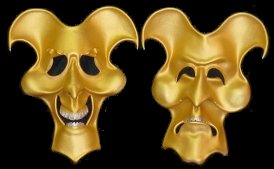|
|
 |
|
1plus1 Productions
|
|
Shakespeare's Women
|
 |
 |
|

A One Hour Staged Reading Where Shakespeare' s Women Speak
HAMLET
Many modernist have proclaimed that William Shakespeare was a "feminist". There are also
those who would say, he was a writer who loved to entertain men. The genius of Shakespeare to exhibit genuine human
behavor has no gender. His depiction of women in a predominately male ruled era surpasses the expectancy of his time.
In the play, Hamlet, of Ophelia, Hamlet renders these words:
Hamlet
"Her speech is nothing,
Yet
the unshaped use of it doth move
The hearers to collection..."
Motherless and completely fixed
by the men around her, Ophelia has been written to reconcile to obvious demands, she must adequetly adhere
to the desires of these men. Her name derives from the Greek word, "help". Ophelia in essence is nothing, an empty vessel,
waiting to be filled by the male figures in her life. She is constantly commanded; "Walk here!", "Go there!", "Think
this!", "Read that!"... Ophelia responds helplessly:
Ophelia
"I do not know, my lord, what I should think"
MACBETH
In Shakespeare's most revered play, MacBeth, certainly
his most masterful tragedy, Lady MacBeth is scribed as an influential, strong, some would say, manipulative, and forcefull character.
She is loving to her husband inspite of her ambitions for him to be king. Without hesitation or regret, she quickly
intices her husband to murder the reigning King Duncan. To avoid the onslought of her own conscience she summons evil
spirits, thus alliveating her soul from remorse. Lady Macbeth knows her husband well. She questions his manhood,
and devotion to her when he wavers on his committment to kill the king. She manipulates her husband and is very persuasive
because he does carry out the deed. The Lady is detailed in her efforts to hide all evidence of her husbands
involvement in the murder. Shakespeare has written in the form of Lady MacBeth, a woman of intense capablity, and
tenacity, even in her immorality. In the end her conscience takes hold and she ends her life, this action shows that
she did what she thought needed to be done in all situations.
Lady MacBeth
(Act 1 Scene 5)
"The raven himself is hoarseThat croaks the fatal entrance of DuncanUnder my battlements. Come, you spiritsThat tend on mortal thoughts, unsex me here,And fill me from the crown to the toe top-fullOf direst cruelty! make thick my blood;Stop up the access and passage to remorse,That no compunctious visitings of natureShake my fell purpose, nor keep peace betweenThe effect and it! Come to my woman's breasts,And take my milk for gall, you murdering ministers,Wherever in your sightless substancesYou wait on nature's mischief! Come, thick night,And pall thee in the dunnest smoke of hell,That my keen knife see not the wound it makes,Nor heaven peep through the blanket of the dark,To cry 'Hold, hold!'"
OTHELLO
|
 |
|
 |
 |
|
Othello is about passion. Great emotion is written in each line of this play. Anger,
love, pain, jealousy, even lust is exhibited. It also examines, in staunch reality, human relationships.
Brabantio, Desdemona father declares that Othello, a Moor, dark of skin...has wooed, used potions and witchcraft
to garner the affections of his daughter. However, Desdemona declares that her love for the Moor is free and of
her own will. Although, by the monologue that Othello delivers in Act 4, it would seem that Desdemona is his
sole property.
|
 |
|
|
|
 |
 |

(Act 4, Scene 1, lines 252-260)
Ay! You did wish that I would make her
turn. Sir, she can turn, and turn, and yet go on And turn again; and she can weep, sir, weep; And she's obedient; as you say,
obedient. Very obedient. Proceed you in your tears. Concerning this, sir-O well-painted passion! I am commanded home. –Get
you away; I'll send for you anon.-Sir, I obey the mandate And will return to Venice.-Hence, avaunt!
|
 |
|
|
|
 |
|
1 + 1 PRODUCTIONS, brings the
words of Shakespeare to life with a twist.
Monolouges of Queen Ann, Lady MacBeth, Desdemona,
Ophelia, The Three Witches, and other female characters are given modern voice.
This staged reading, in the King's
English, articulated from the black woman's esoteric notions, is heartwrenching yet
nonconformist.
It details Shakespeare's works, in spit-fire emotions,
propelling the tragedies that ravage the female psyche.
One should but dare to miss this production!
|
 |
|
|
|
 |
|
 |
|
